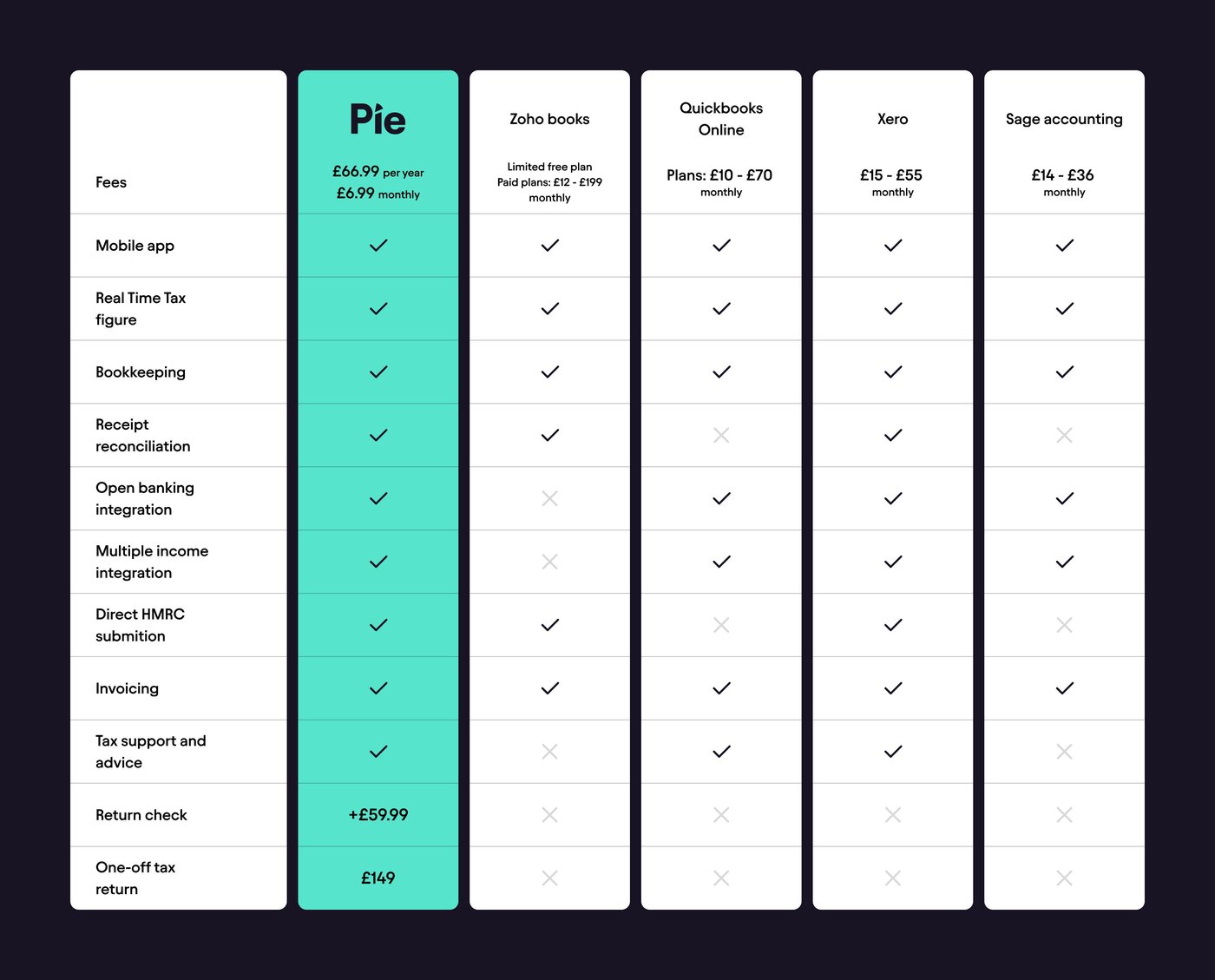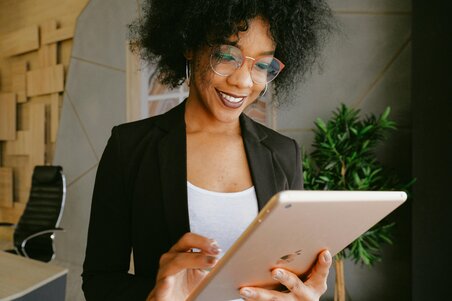In today’s competitive business landscape, small businesses need to stay on top of their financial management. However, finding the right accounting software can be a daunting task. With so many alternatives to Sage Accounting available, it’s essential to evaluate the options based on their features, pricing, and ease of use. This guide will help you navigate the vast array of choices and make an informed decision on the best Sage Accounting alternative for your business. We will be exploring various different software including:
Pie
•QuickBooks Online
•Xero
•Zoho Books
Here is a brief overview of each software’s pricing and features:

*with our premium plan at an extra £3 per month
Exploring Top Sage Accounting Alternatives
As a small business owner, you might be looking for an accounting software that better meets your financial tracking needs or specific accounting requirements. To help you find the best fit, we’ve compiled a list of top Sage Accounting alternatives, focusing on powerful integrations and affordability.
We will now examine some of the market’s most popular choices.


Pie: Outstanding Value and the Most User-Friendly Option
Pie is a stand-out Sage Accounting alternative offering thorough real-time tax information via a user-friendly mobile app. The app grants users access to a comprehensive dashboard featuring all relevant data in one location, allowing for a clear streamlining of income and expenses.
There are two pricing plans to consider with Pie:
- Essential: £6.99 per month
- Premium: £9.99 per month
There is also a 60-day free trial available for anyone that wants to try out the app before they sign up to either plan.
In addition to the handy mobile app, there are various other advantages to using Pie. For example, it has approval from both HMRC and CIMA, and the company is also FCA regulated.
With Pie, you can benefit from the following features:
- Real time tax
- Bookkeeping
- Sector specific tax assistants
- Invoicing tools
- Multiple incomes in one place
- And much more…
Managing multiple streams of income becomes a breeze with Pie, and the personalised guidance from tax assistants is an excellent resource. But the most notable highlight here is how user-friendly the app is; the interface is completely intuitive, and consistently rewards users with a smooth experience every time they call upon it.


QuickBooks Online: Versatile Software with Flexible Pricing
QuickBooks Online stands out as a strong Sage Accounting alternative due to its wide range of features. Small businesses can benefit from its cost-effective pricing tiers, making it an affordable accounting software option. With online accounting capabilities, QuickBooks Online provides automated online banking, tax calculation, invoicing, bill management, and check printing.
QuickBooks Online offers a number of different pricing plans, including:
•Self-Employed: £10 per month
•Simple Start: £14 per month
•Essentials: £24 per month
•Plus: £34 per month
•Advanced: £70 per month
Seamless integration with third-party applications and bank accounts allows for efficient bank reconciliation and payment processing. This helps businesses stay up-to-date with their financial data and ensures timely payments from clients. Invoice creation and management, expense tracking, and accounts receivable and payable management are just a few clicks away with QuickBooks Online.
Not only does QuickBooks Online offer essential accounting tools, but it also supports advanced features like project accounting, credit card processing, and inventory tracking.

Xero: Flexibility and Powerful Integrations
Xero is a highly-regarded Sage Accounting alternative, offering flexibility and powerful integrations for small and medium-sized businesses. Xero offers a wide variety of accounting solutions, including:
•Bank reconciliation
•Expense claims
•Financial reporting
•Inventory management
•Invoicing
•Payroll management
•Project tracking
Xero’s bank reconciliation feature automates the process of matching bank transactions, simplifying financial management for businesses. Its multi-currency support and mobile capabilities enable businesses to expand their operations and reach a global audience.
Xero offers several pricing plans to cater to different business needs. Here is a full list of the options:
•Starter: £15 per month
•Standard: £30 per month
•Premium: £42 per month
•Ultimate: £55 per month
Integration with third-party applications and other Xero products allows businesses to streamline their operations and focus on growth. Customisable templates, personalised workflows, and modular design make it easy for businesses to tailor the software to their specific requirements. Xero’s project time tracking and online invoicing features enable businesses to manage their finances efficiently and stay ahead of the competition.

Zoho Books: Flexible Option for Small-to-Medium Sized Businesses
Zoho Books is another good alternative to Xero, providing an effective solution for small to medium-sized businesses. This cloud-based accounting software offers a range of features, including alternatives to Xero such as:
•Inventory management
•Expense tracking
•Project management
•CIS and VAT
•Integration with up to 40 tools
Zoho Books offers a free plan, as well as additional paid plans, making it a flexible option for businesses with varying budgets. The free plan is only suitable for businesses with revenue under £35,000 per annum, accommodates just 1 user & accountant, and has limited support. Here is a full breakdown of the paid plans:
•Standard: £12 per month
•Professional: £24 per month
•Premium: £30 per month
•Elite: £99 per month
•Ultimate: £199 per month
For businesses in need of more specialised features, Zoho Books provides add-on options that let you amplify your accounting capabilities without necessitating an upgrade to a more expensive plan. This makes Zoho Books an ideal choice for businesses that need a scalable accounting solution.

In-Depth Comparison: Sage Accounting Alternatives
Having highlighted the top alternatives to Sage Accounting, a more detailed look into their pricing plans, key features, and ease of use is necessary for an informed decision.
Next, we will delve into a comprehensive comparison of these alternatives, assisting you in identifying the best option for your business needs.
Pricing Plans and Affordability
In terms of the pricing plans and affordability of Sage Accounting alternatives, taking into account the diverse options available is of great importance.
Considering your business requirements and budget is vital when evaluating the pricing plans of Sage Accounting alternatives. By assessing the features offered by each alternative and the associated costs, you can make an informed decision that aligns with your financial capabilities.


Key Features and Functionality
The key features and functionality of Sage Accounting alternatives differ, presenting a variety of options to cater to diverse business needs. Some examples include:
- QuickBooks Online: offers essential accounting tools like invoicing, expense tracking, and bank reconciliation.
- Xero: provides inventory tracking, project tracking, and multi-currency support, catering to businesses with more advanced requirements.
- Zoho Books: offers time tracking, project management, and multi-currency support, ensuring businesses can efficiently manage their finances and operations.
- Pie: offers real time tax, reconciliation, sector-specific tax assistants, bookkeeping tools, multiple incomes in one place, intuitive & user-friendly mobile app, and much more.
When evaluating Sage Accounting alternatives, considering the key features and functionality that align with your business needs is crucial. By comparing the various options available, you can determine the best solution for your financial management requirements.
Ease of Use and Learning Curve
The ease of use and learning curve associated with Sage Accounting alternatives differ among the available options.
Some Sage alternatives offer a more comprehensive set of tools and features, which may require a steeper learning curve for users unfamiliar with accounting software. However, the customisation options and advanced functionality provided by these alternatives can be beneficial for businesses with more complex financial management needs.
By weighing the user-friendliness and functionality of each alternative, you can make an informed decision that suits your unique requirements.


Choosing the Right Alternative for Your Business Needs
Choosing the ideal alternative to Sage Accounting for your business requires evaluating your specific needs and aligning them with the features and pricing plans of the available alternatives.
Next, we will walk you through the process of assessing your business needs and identifying the most suitable Sage Accounting alternative to meet those needs.
Assessing Your Business Requirements
Before reviewing Sage Accounting alternatives, it’s important to determine your business needs and set a budget for the solution. Consider factors such as the size of your business, the complexity of your financial management needs, and the level of accounting expertise among your team members.
In addition to budgeting for the cost of the accounting software, take into account any additional fees associated with the expense management solution, such as customer support, upgrades, and third-party integrations. This will help you avoid surprises down the line and ensure you’re making a cost-effective decision for your business.
Some essential requirements for a Sage Accounting substitute include:
•User-friendliness
•Features that align with your business needs
•Cost-effectiveness
•Reliability
By assessing your requirements and prioritising the most critical features, you can narrow down the list of Sage Accounting alternatives and focus on those that best meet your needs.

Matching Alternatives to Your Needs
After determining your business needs, the next step involves aligning the available alternatives with your requirements. Start by comparing the features, pricing plans, and other factors of the alternatives discussed in this guide.
Consider the key features and functionality of each alternative, such as:
•bank reconciliation
•tax management
•project accounting
•expense tracking
•online payment processing
Evaluate the ease of use and learning curve associated with each software, ensuring you select an option that can be easily adopted by your team.
By carrying out a detailed evaluation of the Sage Accounting alternatives and taking into account your specific business requirements, you can make an informed decision and choose the most suitable solution for your financial management needs. This will ensure that you have the tools and resources necessary to maintain accurate financial records and drive your business’s success.
Summary
In conclusion, choosing the right Sage Accounting alternative for your business involves assessing your specific requirements and evaluating the features, pricing plans, and ease of use of the available options. By considering alternatives like QuickBooks Online, Xero, Pie, and Zoho Books, you can find the perfect solution to meet your financial management needs and drive your business’s success. Keep in mind that the right accounting software can make a significant impact on your business operations and financial health, so take the time to make an informed decision that aligns with your unique requirements.
Frequently Asked Questions
What software is similar to Sage Accounting?
Sage Accounting has many similar features to popular online accounting solutions such as Xero, QuickBooks, and NetSuite. It is also comparable to desktop solutions like QuickBooks Desktop Pro, SAP Business One, and Microsoft Dynamics 365 Business Central.
Which is the best Sage Accounting alternative?
Determining the best Sage alternative will come down to your business’s unique needs e.g. the size of the business and any industry-specific features that may be required. The free package offered by Zoho Books may be most suitable for you if price is the primary factor in your decision. However, if you’re looking for a wide range of features and a user-friendly interface, Pie will likely be a better choice for your business.
What should I take into consideration when selecting accounting software?
When deciding on accounting software, factor in your business's size, the features required for your specific industry, and ensure it aligns with your budget.




